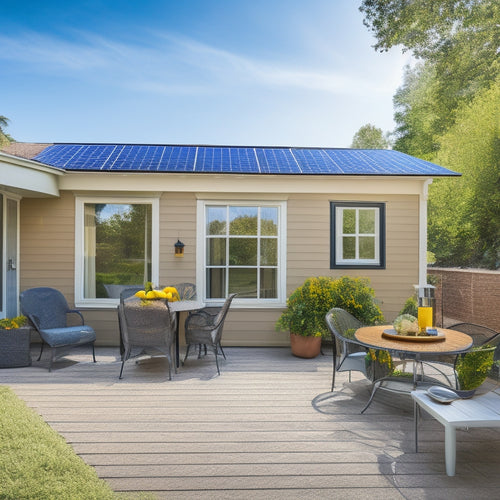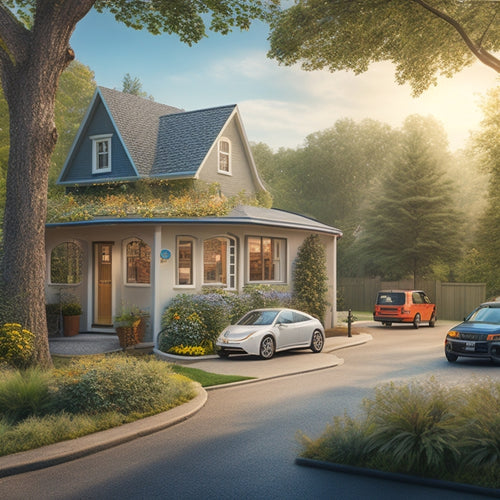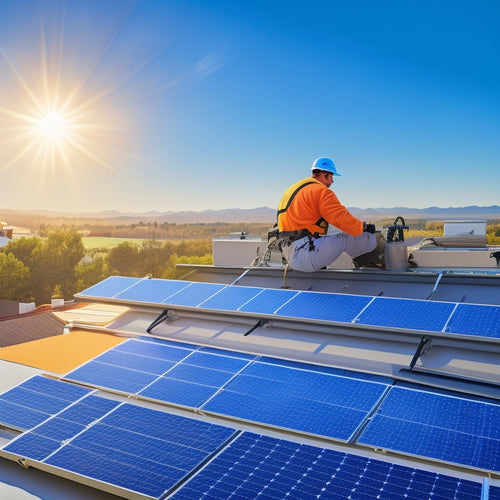
What Are 7 Key Solar Panel Price Factors
Share
When investing in solar panels, you'll want to evaluate seven key factors that impact pricing. Module efficiency and quality, for instance, can greatly affect your system's overall performance and cost. The installation company and labor you choose will also influence the final price, as will the size and complexity of your system, including roof characteristics and local permitting requirements. Inverter type and brand, as well as battery backup and energy storage options, are additional factors that can drive up or reduce costs. By understanding these factors, you'll be better equipped to make an informed decision - and there's more to investigate that can help you make the most of your investment.
Key Takeaways
- Module efficiency and quality impact solar panel pricing, with higher efficiency leading to more power generation per unit area.
- Installation company and labor costs vary based on company reputation, expertise, and location, with quality workmanship and certifications being crucial.
- System size, complexity, and roof characteristics significantly influence overall installation costs, with larger systems and complex designs increasing expenses.
- Local permitting and inspections add to project costs and timelines, with compliance with local regulations being essential to avoid delays and extra expenses.
- Inverter type, brand, and efficiency ratings affect system performance and cost, with higher efficiency ratings correlating with increased power output and faster ROI.
Module Efficiency and Quality
Your solar panel's module efficiency and quality play a crucial role in determining its overall performance and pricing. The efficiency of a solar panel module refers to its ability to convert sunlight into electrical energy. Higher efficiency modules can generate more power per unit area, making them more desirable.
Recent solar technology advancements have led to considerable improvements in module efficiency, with top-tier manufacturers now offering efficiencies of over 22%.
The quality of a solar panel module is also critical, as it directly impacts its durability and reliability. Module manufacturing processes, such as the type of silicon used and the quality control measures in place, can greatly affect a panel's quality.
Look for modules with a proven track record of performance and a strong warranty to guarantee you're getting a high-quality product. When evaluating module efficiency and quality, consider the manufacturer's reputation, the module's certifications, and its performance ratings.
Installation Company and Labor
Installed correctly, a solar panel system can provide decades of clean energy, but a subpar installation can lead to reduced performance, safety hazards, and even system failure.
You need a reliable installation company with experienced professionals to guarantee your system operates at its best. The installation company's experience and labor costs greatly impact the overall price of your solar panel system.
Here are three key factors to evaluate when assessing an installation company:
-
Installation experience: A company with a proven track record of successful installations can provide better quality workmanship, reducing the risk of errors and guaranteeing a smoother installation process.
-
Labor costs: The cost of labor varies depending on the company's reputation, knowledge, and location. Be wary of extremely low labor costs, as they may indicate a lack of experience or low-quality work.
-
Certifications and warranties: Look for companies with industry-recognized certifications, such as NABCEP, and extensive warranties that cover both the installation and the equipment.
System Size and Complexity
As you've guaranteed a reliable installation company, it's time to focus on the system itself. The system size and complexity greatly impact the overall cost of your solar panel installation. Your energy needs, geographic factors, and system layout all influence the complexity of your system.
For instance, if you have a large energy demand, you'll require a more extensive system, which increases the cost. Additionally, design considerations, such as accommodating obstacles like trees or skylights, can add to the complexity and expense.
The system's size and complexity also affect maintenance costs and financing options. A more complex system may require more frequent maintenance, increasing costs over time.
However, technological advancements have made it possible to optimize system design, reducing costs and improving efficiency. Your installation company will assess your energy needs and geographic factors to design a system that meets your requirements while minimizing costs.
Roof Size and Material Type
Roof size and material type play a significant role in determining the cost of your solar panel installation. A larger roof requires more solar panels to generate the same amount of power, increasing the overall cost. Additionally, the type of roofing material you have can impact the installation process and cost. For example, a metal roof may require specialized mounting hardware, adding to the expense.
When evaluating your roof's suitability for solar panels, consider the following factors:
-
Roof orientation: A south-facing roof is ideal for solar panels, as it receives the most direct sunlight. East- or west-facing roofs can also work, but may require more panels to achieve the same energy output.
-
Roof size and layout: A larger roof provides more space for solar panels, but may also require more complex installation and wiring.
-
Shading analysis: Trees, chimneys, or other obstructions can cast shade on your roof, reducing the effectiveness of your solar panels. A shading analysis can help identify the best placement for your panels.
Understanding these factors will help you determine the most cost-effective and efficient solar panel installation for your home.
Local Permitting and Inspections
Before breaking ground on your solar panel installation, you'll need to maneuver local permitting and inspections, which can greatly influence the overall cost and timeline of your project.
These processes vary by region, and compliance with local regulations is vital to avoid project delays and additional expenses. The permitting timeline can range from a few weeks to several months, depending on the complexity of your project and the efficiency of your local government.
Municipal fees for permits and inspections can add up quickly, so it's important to factor these costs into your initial budget.
You'll need to guarantee your installation meets local zoning laws and building codes, which may require additional inspections and certifications.
Inspection costs will depend on the type and number of inspections required, which can range from a few hundred to several thousand dollars.
Inverter Type and Brand
When you're evaluating solar panel systems, you'll encounter different inverter types and brands, each with their own characteristics that impact system performance and cost.
You'll want to assess inverter efficiency ratings, as they directly affect how much power your system can produce.
The brand reputation and cost variance analysis will also play a significant role in your decision, as they influence the overall value of your investment.
Inverter Efficiency Ratings
You're likely familiar with the importance of inverter efficiency in a solar panel system, as it directly affects the amount of energy your system can produce.
Inverter efficiency ratings play a significant role in determining the overall performance of your solar panel system. A higher efficiency rating means more power output and a faster return on investment.
When evaluating inverter efficiency ratings, consider the following key factors:
-
Maximum Power Point Tracking (MPPT): This feature guarantees your inverter extracts the maximum amount of power from your solar panels, even during periods of low sunlight.
-
Inverter lifespan: A longer-lasting inverter means less maintenance and replacement costs over time, resulting in higher overall efficiency.
-
Inverter maintenance: Look for inverters with self-diagnostic capabilities and remote monitoring to minimize downtime and optimize performance.
Brand Reputation Matters
Most solar panel systems rely on a handful of reputable brands for their inverters, and for good reason. When you invest in a top-tier brand, you're not just buying a product - you're buying a reputation for quality, reliability, and performance.
Established brands like Enphase, SMA, and Fronius have built a loyal customer base through consistent delivery of high-quality products and exceptional customer service. This brand loyalty translates to a higher resale value for your solar panel system, making it a smart long-term investment.
You can gauge a brand's reputation by reading customer reviews and ratings from trusted sources like EnergySage or SolarReviews. Look for brands with consistently high ratings and positive feedback from customers who've installed their systems.
A reputable brand will also offer thorough warranties, dedicated customer support, and reliable maintenance services. By choosing a top-brand inverter, you're ensuring a smooth, hassle-free experience and ideal energy harvesting for years to come.
Cost Variance Analysis
Inverter type and brand greatly impact the overall cost of a solar panel system, with prices varying widely depending on the technology and manufacturer chosen. When evaluating inverter options, you'll find that different types, such as string inverters, microinverters, and power optimizers, have distinct price points. Additionally, the brand reputation and quality of the inverter also influence the overall cost.
Here are 3 key factors to take into account when reviewing the cost variance of inverter types and brands:
-
Technological advancements: Advances in inverter technology have led to more efficient and cost-effective options, which can impact the overall system cost.
-
Competitive environment: The solar market trends and competitive environment also play a role in determining inverter prices, as manufacturers adjust their pricing strategies to stay competitive.
-
Financing options and government incentives: Your financing options and available government incentives can also influence the cost of the inverter, as some programs offer rebates or discounts for specific brands or technologies.
When choosing an inverter, take into account the environmental impact, consumer awareness, and your overall power needs to make an informed decision that aligns with your budget and goals.
Battery Backup and Storage
You're likely contemplating solar panels for their environmental benefits and potential cost savings, but you also need to think about energy storage options.
A battery backup system can provide backup power during grid outages, and some systems even enable off-grid capabilities.
As you weigh your options, you'll want to evaluate the type and brand of energy storage solutions, as well as their compatibility with your solar panel system.
Energy Storage Options
With the rise of solar energy, homeowners and businesses are increasingly looking for ways to store excess energy generated during the day for use during the night or on cloudy days. This makes energy storage options an essential factor in the overall solar panel system.
When it comes to energy storage options, you'll want to evaluate the type of energy storage technologies that best suit your needs. Some key factors to take into account include:
-
Battery Type: Different battery types, such as lead-acid, lithium-ion, or nickel-cadmium, have varying efficiencies, lifespans, and costs.
-
Battery Lifespan: The lifespan of your battery will impact how often you need to replace it, affecting your overall costs. Look for batteries with a long lifespan to minimize replacement costs.
-
Depth of Discharge: The depth of discharge (DOD) indicates how much of the battery's capacity can be safely used without reducing its lifespan. A higher DOD means more efficient energy storage.
Backup Power Systems
As you consider your energy storage options, backup power systems emerge as an essential component, allowing you to tap into stored energy during power outages or when the grid is down. This means you can maintain energy independence, even when the utility grid is unstable.
By incorporating a backup power system into your solar panel setup, you'll be able to store excess energy generated by your renewable resources during the day for use during the night or in emergency situations.
Backup power systems enhance grid stability by reducing the strain on the grid during peak hours. Plus, many solar incentives offer rebates and tax credits for homeowners who invest in energy storage solutions like backup power systems.
With a backup power system, you'll have peace of mind knowing you're prepared for emergency situations, and you'll be able to maintain energy resilience even when the grid is down.
Off-Grid Capabilities
Grid independence becomes a reality with off-grid capabilities, which rely on battery backup and storage to sever ties with the utility grid.
You'll no longer be reliant on the grid for power, and instead, can utilize the full potential of renewable energy. This setup allows you to store excess energy generated by your solar panels during the day for use at night or during power outages.
With off-grid capabilities, you'll enjoy:
-
Energy independence: Break free from the grid and generate your own power, reducing your reliance on fossil fuels and minimizing your environmental impact.
-
Cost savings: Store excess energy and reduce your energy bills, while also taking advantage of government incentives for sustainable energy solutions.
-
Technology advancements: Utilize the latest advancements in battery storage technology to optimize your energy storage and usage, ensuring maximum efficiency and sustainability benefits.
Frequently Asked Questions
Can Solar Panels Be Installed on a Metal Roof?
As you weigh the pros of utilizing solar energy, you'll be relieved to know that, yes, you can install solar panels on a metal roof, capitalizing on its advantages like durability and ease of installation, while considering factors like roof pitch and material compatibility.
Do Solar Panels Work During a Power Outage?
During a power outage, you'll find that grid-tied systems, which prioritize solar panel efficiency, won't provide power since they're designed to sync with the grid; however, you can opt for battery-backed systems or generators for backup power during outages.
How Long Does It Take to Install Solar Panels?
You'll typically spend 2-5 days overseeing the installation process, which involves evaluating your roof, installing mounting systems, and connecting panels to an inverter, with the entire installation timeline taking around 1-3 months from planning to powering up.
Can I Install Solar Panels Myself?
Like a DIY warrior, you're considering tackling solar panel installation solo, but be warned: it's a complex task requiring precision and safety protocols, so unless you're an electrician, it's best to leave DIY solar to the pros.
Do Solar Panels Increase My Property Value?
You'll be pleased to know that installing solar panels can enhance your property value, according to a property appraisal, as it's considered a worthwhile investment, offering a significant return, which can increase your property's appeal and resale value.
Related Posts
-

10 Tips to Buy Affordable Solar Panels Online
When purchasing affordable solar panels online, you'll want to research reputable retailers, compare prices, and chec...
-

Why Nearby EV Conversion Shops Matter to You
Having a nearby EV conversion shop means you'll experience the benefits of a more personalized, convenient, and susta...
-

3 Essential Steps for Solar Electricity Installation
To guarantee a successful solar electricity installation, you'll need to follow three essential steps. First, assess ...


